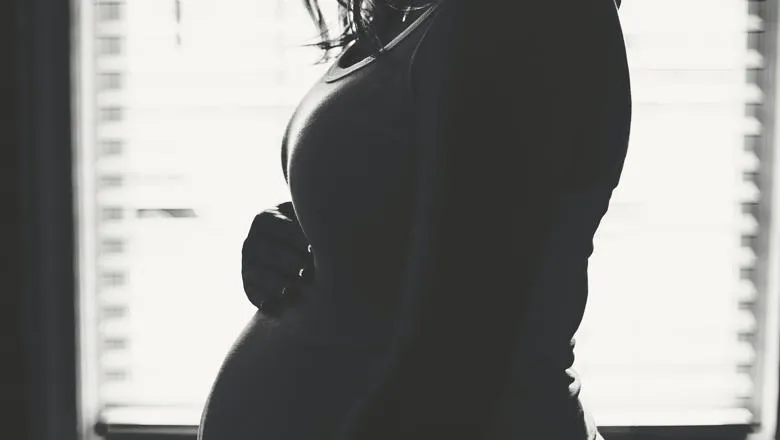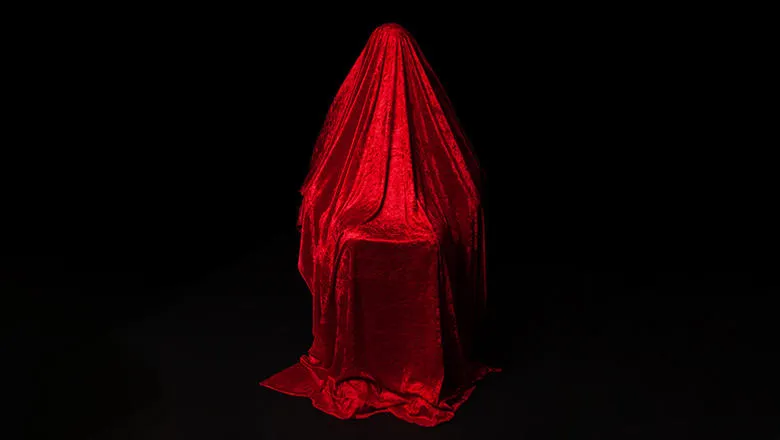The Hidden Mothers exhibition shines a light on HG which is often dismissed as "just bad morning sickness” but in reality, can be tragic. We've made good progress to raise awareness of HG and to write national guidelines to guide the care of these women, but more research is needed to understand and treat the condition better.
Dr Melanie Nana
04 June 2025
Survivors of extreme pregnancy sickness share their stories for exhibition
Women who have experienced the debilitating pregnancy sickness condition Hyperemesis Gravidarum (HG) have shared their hard-hitting stories for a new free photography exhibition at Science Gallery London.

The Hidden Mothers exhibition at Science Gallery London features powerful and emotional portraits by photographer Clare Hughes, accompanied by personal captions by the women that highlight the life-limiting reality of living with Hyperemesis Gravidarum during pregnancy.
Rachael Buabeng, one of the women featured, said having the condition had reshaped her life in ways she could never have imagined.
“Experiencing Hyperemesis Gravidarum meant surrendering control over my own boy, my days, and my life choices. I often wondered if my body was broken, if medication was safe, and if healthcare professionals truly understood or believed my experiences,” she said.
“Raising awareness about Hyperemesis Gravidarum has been a crucial part of my healing process, though it remains ongoing. It’s vital for everyone to understand this condition so they can offer support and seek help if needed.
“And please, no more suggestions about ginger!”
This new exhibition is linked to a project led by King’s College London and Guy’s and St Thomas’ NHS Foundation Trust, which aims to ensure all Hyperemesis Gravidarum sufferers can access guideline-recommended care for the condition.
Funded by a UKRI England Policy Support grant, the project is led by Dr Melanie Nana, NIHR Clinical Research Fellow at King’s College London and Locum Consultant Obstetric Physician at Guy’s and St Thomas’ NHS Foundation Trust, and Dr Jennifer Fraser, Research Associate at King’s Department for Global Health and Social Medicine, alongside Professor Catherine Nelson-Piercy, Professor of Obstetric Medicine at King’s and Professor Catherine Williamson, Professor of Women’s Health at Imperial College London.
Their work has driven impactful changes to the way in which Hyperemesis Gravidarum is perceived and the care that women receive.
One such change is that Hyperemesis Gravidarum is now included in the Women’s Health Strategy, meaning it is prioritised in the government’s 10-year ambition to improve the health and wellbeing of women in England.
The work has also resulted in an update to the national guidance on Hyperemesis Gravidarum, improving the day-to-day management of the condition across all healthcare settings – including emergency departments, GP practices and secondary care.
Dr Jennifer Fraser said: “Multidisciplinary approaches are essential to improving the lives of women with Hyperemesis Gravidarum and developing more holistic forms of care and support.
“The Hidden Mothers exhibition, and other policy interventions made possible by the UKRI England Policy Support grant are great examples of how health research, humanities scholarship, and arts-based practice can come together to keep Hyperemesis Gravidarum on the political agenda and drive meaningful change in research, education, and advocacy.”
To shed light on past policy successes and offer a blueprint of how effective changes to women’s health policies are made, Dr Fraser is conducting oral history interviews with key figures involved in past and present Hyperemesis Gravidarum related policy development.
The team is also now leading a UK-wide service evaluation of Hyperemesis Gravidarum care, to inform service development and a UK economic analysis, and has hosted a series of educational events for healthcare workers to ensure those looking after women with Hyperemesis Gravidarum are equipped with up-to-date knowledge.
Affecting 30,000 women every year, Hyperemesis Gravidarum is defined as debilitating nausea and vomiting during pregnancy that can lead to weight loss and dehydration. In some cases, Hyperemesis Gravidarum is so debilitating that women report feeling so physically and mentally unwell that they want to terminate a wanted pregnancy or have suicidal thoughts.
Dr Melanie Nana, an NIHR Clinical Research Fellow at King’s College London and Locum Consultant Obstetric Physician at St Thomas’ Hospital, London, who has been invited to give her expert opinion on HG care for the Department of Health, and to discuss the inclusion of HG research in further priorities, added: “Pregnancy should be an exciting and happy time for mothers-to-be, but for the around 3% with Hyperemesis Gravidarum (HG), it can be debilitating.
“Women can vomit 40+ times per day and 1 in 5 will vomit all the way until they give birth. Our previous work showed that 5% of these women terminate a wanted pregnancy and 7% have regular suicidal thoughts due to become so unwell because of the condition. The Hidden Mothers exhibition shines a light on HG which is often dismissed as "just bad morning sickness” but in reality, can be tragic. We've made good progress to raise awareness of HG and to write national guidelines to guide the care of these women, but more research is needed to understand and treat the condition better.”
The Hidden Mothers
Based on Victorian ‘hidden mother’ style photography, Clare Hughes has created staged ‘hidden’ portraits to represent the concealed stories of women who have gone unrecognised by the medical establishment for centuries. Balancing this is a ‘revealed’ portrait of each woman behind an accompanying written testimony. Ranging in age and background, their stories merge to share their trauma and resilience.

Clare Hughes, who has also suffered with HG herself, said: "I wanted to use my creativity to help shed light on this horrendous condition that I didn’t know existed until it was happening to me, and no one else seems to talk about.
The Hidden Mothers exhibition is open to the public from Tuesday 3 June to Saturday 14 June (11am – 6pm, free entry) at Science Gallery London, Great Maze Pond London, England, SE1 9GU.
Whole-life health for mind and body at Science Gallery London
The Hidden Mothers is one of three exhibitions at Science Gallery London, part of King's, emerging from research and supporting the One King’s Impact priority of ‘whole-life health for mind and body’.
Lifelines: Rethinking Ageing Across Generations and The Art of Care: Medical Students Learning Through A Different Lens, are also part of the summer programme at Science Gallery London, produced and supported by King's Culture.
